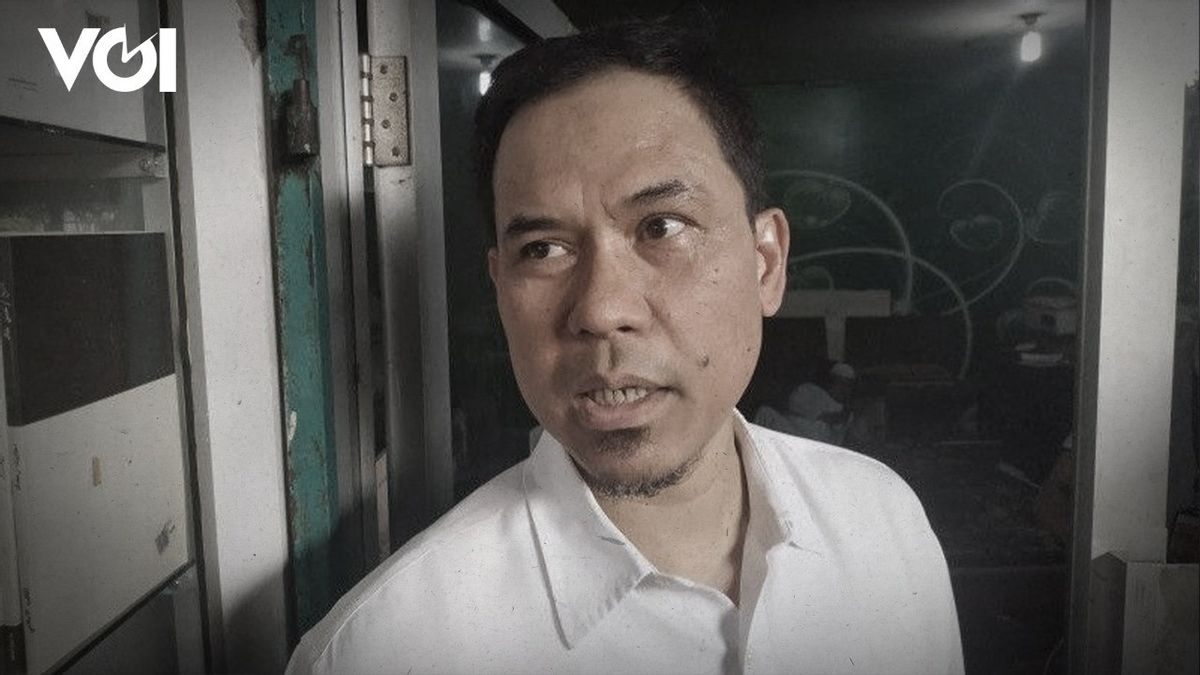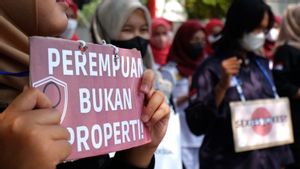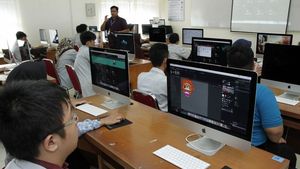
After the return of former Islamic Defenders Front (FPI) supporter Muhammad Rizieq Shihab to the country, a series of controversial events emerged. Starting from the emergence of health protocol violations, the shooting of six FPI soldiers, and most recently the arrest of former FPI General Secretary, Munarman who was allegedly involved in acts of terrorism. Munarman's case came under the spotlight because he was not only known as a former top official of a banned organization, but also from his track record of "emigrating." The first article of VOI's special series "FPI Controversy," about Munarman's ideological leap.
Munarman was born on September 16, 1968, in Palembang, South Sumatra. He was the sixth of eleven children. Munarman's father, H. Hamid is a retired Public School teacher, while his mother is Nurjanah. His parents managed to bring him to the end of law at Sriwijaya University, Palembang.
Munarman rose to prominence as a civil rights activist. It all started when he became part of the Indonesian Legal Aid Foundation (YLBHI) in Palembang in 1995. He started his career from a volunteer. Thanks to his good performance during his two years of work, he got promoted as Head of Operations of YLBHI Palembang.
As a civil rights activist, Munarman was the Coordinator of Aceh Contrast (1999-2000). Afterwards, Munarman occupied the chair of the Coordinating Board of The Commission for Missing Persons and Victims of Violence (KontraS) in Jakarta.
Armed with a series of experiences that munarman career continues to rise. Visiting Kompas Daily, September 25, 2002, Munarman who worked for KontraS was elected as Chairman of the Board of Executives of YLBHI (2002-2007). Munarman won 17 votes from YLBHI's 24-member Board of Trustees. While his opponent, Daniel Panjaitan got only six votes and one more vote abstained. While chairman of YLBHI from 2002 to 2007, Munarman made a breakthrough in his two-month tenure.
At that time YLBHI known as the locomotive of Indonesian democracy almost rolled out. Foreign funders resigned one by one, employees asked to stop, and 14 regional branches would close.
Munarman and the board of trustees also turned the brain. Until he took the unpopular decision, namely cutting the hajj of the staff 50 percent and eliminating the Hari Raya Allowance (THR) temporarily. The move could be a solution to YLBHI's depleted cash.
"The deterioration of course the welfare of lawyers and employees. Lawyers now have to earn income by also working in other outside legal entities. In the area, some lawyers open their own law advocate offices in addition to trying to find opportunities to become members of the Regional Representative Council or active in the Election Supervisory Committee. Some of the regional managers are also doing small businesses," said Munawarman quoted by Nurdin Kalim DKK in Tempo Magazine (2003).
"Fundraising to restore the work of the locomotive of democracy is never done. YLBHI administrators, for example, have distributed donation letters to their alumni. But the results were minimal: most of lbh alumni just gave moral support so that YLBHI did not disband. The fund night held last month at Hotel Indonesia (HI) was also not successful, even the committee was kettled. The Assistance of Rp500 million that had been given by President Megawati's husband, Taufik Kiemas, became polemic," the report added.

Munarman (Photo: Antara)
Munarman became known when he participated in the team of lawyers led by the Indonesian Mujahideen Assembly, Abu Bakar Ba'asyir. At the time, Abu Bakar stumbled upon the Bali bombings and was sentenced to 2.5 years in prison.
It was when he was close to Abu Bakr Ba'asyir that Munarman began to become fascinated with the Islamic movement. One of the moments that came to Munarman was when the police urged Ba'asyir to keep talking, but Ba'asyir chose to remain silent.
Ba'asyir, said Munarman never complained about legal issues. Moreover, Ba'asyir is consistent with his attitude. This includes aligning between thinking and doing. That's what Munarman admires.
Furthermore, after his release from Abu Bakar's team of lawyers he began to be close to the Hizbut Tahrir Indonesia (HTI) network. His closeness to HTI made Munarman get to know several figures including FPI supporter Muhammad Rizieq Shihab.
Inner struggleIn the political spectrum, LBH activists are usually often associated with the left or center left. This group is usually closely related to the ideology of socialism. While what Munarman did then he was considered to cross the spectrum right or center right. The group is usually attached to religious communities and nationalist people. So how can such ideological leaps happen?
When interviewed by Refly Harun on his Youtube Channel, Munarman explained how his ideology can change. He claimed to be actually a person who held on to the sure thing. "If this ideology I think there is a problem, I'm a person who is always looking for something that confirms fix. I'm a legal person. The law must be sure," Munarman said.
Then the second reason why Munarman did "hijra" is because he wanted to consequently between his deeds and his speech. And he sees those values as being in Islam.
"I think in the secular world there are too many discrepancies, between one opinion and another. As if it moves too freely... Then I saw from the many references, in the end I saw a reference in the Islamic world that was quite confirmation actually," said Munarman.
Then another factor that made Munarman make the leap was because it was inspired by the figure of Abu Bakar Baasyir. Munarman, who at that time was abu Bakr's attorney, said he was amazed by the consistency between the speech and the actions of the ustaz.
"So at that time LBH defended Ustaz Abu Bakar Baasyir. In the process of defense, between the suitability of the attitude of an Abu Bakr Baasyir, what he said with what his actions, that's the difference a little bit," he said.

The closeness to the Islamic society made him involved in an event called Monas Indent 2008. In that incident, Munarman served as commander of the Islamic Warriors Command.
Munarman proved to be among the groups that beat up and intimidated the National Alliance for Religious Freedom and Belief (AKKBB). Munarman's whereabouts are a big question for many. Because, he used to be known as a civil rights activist.
"On the day of the rally, an Islamist umbrella group calling itself Laskar Islam or 'defenders of Islamic orders' under munarman and FPI chairman Rizieq Shabib appeared in the square and attacked the protesters, beating up a number of prominent NGO Muslim leaders. Munarman later said that the attack was related to a previously cited AKKBB media advertisement. He follows a certain logic that mainstream Muslims are threatened by the presence of Ahmadis," Yew-Foong Hui wrote in Encountering Islam: The Politics of Religious Identities in Southeast Asia (2013).
As a result, many Muslim organizations, including Nahdlatul Ulama (NU) demanded fpi to be tried for monas incident. In the aftermath, 58 Islamists, including FPI leaders Rizieq Shihab and Munarman were arrested in an operation involving 1,500 officers. In the confinement, Munarman's cell is adjacent to Rizieq Shihab's cell.
Nine months, until it was moved to an open prison. According to Munarman he learned many aspects of religious science from Rizieq Shihab, starting from the same prayer ordinances of thought and sectarian differences. Rizieq's ideology inspired Munarman. He referred to Rizieq as a nationalist figure. Out of prison in 2009, Munarman increasingly intensively communicated with Rizieq Shihab. Munarman was also offered actively to join FPI.
"Since 2009 I was finally the chairman of the field. First Head of Nahi-Munkar 2009-2013... After that, because my reference is quite a lot, I became chairman of the Expert Board, so the board of experts until 2015, and continued as Chairman of the Organization to organize FPI to make the structural more agile. It's done, I was asked to be a sekum," explained Munarman.
The English, Chinese, Japanese, Arabic, and French versions are automatically generated by the AI. So there may still be inaccuracies in translating, please always see Indonesian as our main language. (system supported by DigitalSiber.id)












